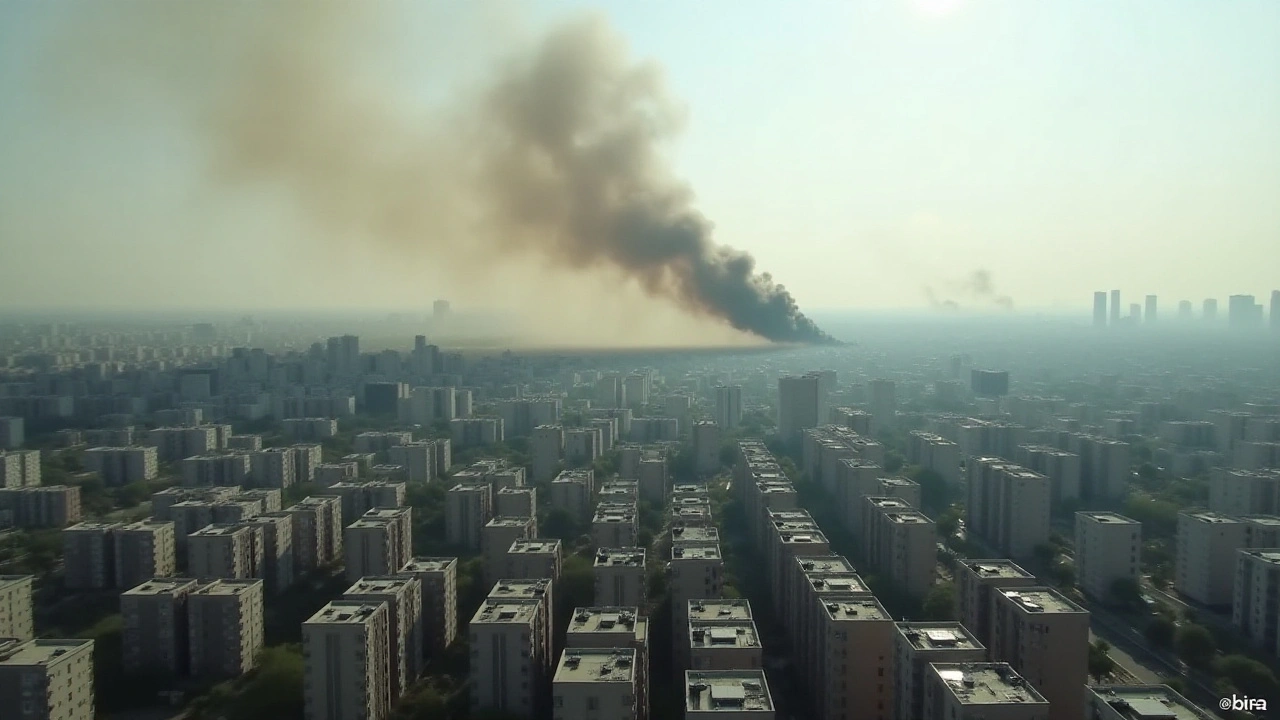Airlines Alter Routes Following Iranian Missile Offensive
Recent geopolitical tensions have once again rippled through the aviation industry, triggering a reactionary wave of flight diversions following Iran's missile strike on Israel. The coordinated assault involved the launch of 181 missiles, a clearly orchestrated aggression that escalated the ongoing conflict in the Middle East. This has caused major disruptions in air travel as airlines scrambled to alter their flight paths in response to the potential peril of flying over Israeli airspace.
The attack saw prompt and decisive action as the US, Israel, and Jordan pooled their missile defense capabilities to intercept the majority of the projectiles. Although their combined efforts managed to mitigate a significant portion of the threat, the aftermath was still severe: a Palestinian fatality and injuries to two Israelis. This incident serves as a grave reminder of the volatile nature of the region and its far-reaching implications.
Global Response and the Israeli Retaliation Promise
In the face of this aggression, Israel’s Prime Minister issued a stern warning, asserting that Iran will 'pay for it.' This strongly worded declaration signals a substantial response, one that seeks not only retribution but also deterrence. The United States has aligned itself firmly with Israel, promising assistance in delivering 'severe consequences' to Iran. This stands in contrast to the more restrained approach observed following an attack in April, indicating a shift towards a more assertive stance.
International aviation authorities have not remained idle amid these developments. Multiple European airlines have temporarily suspended their flights to Tel Aviv, citing safety concerns. This decision, while understandable, has inadvertently stranded numerous Israeli travelers abroad. The sudden influx of demand has left local airlines stretched thin, struggling to accommodate the surge in passengers needing to return home.
Industry-Wide Impacts
The fallout from the missile strike has dealt yet another blow to an industry already reeling from various geopolitical conflicts. The ongoing skirmishes between Israel and Hamas, as well as Russia and Ukraine, had already cast a long shadow over aviation. This latest development compounds the issues, amplifying the strain on an industry striving to maintain its operations under increasingly challenging conditions.
The Israeli government, eager to restore normalcy, is actively working to counteract the European Union's advisory to avoid its airspace. Efforts are being made to reassure international partners and air carriers of the safety and stability of Israeli airspace, a crucial message in an arena where trust and security are paramount.
Series of Escalating Events
This missile attack is not an isolated incident but rather part of a series of escalating events that underline the region's chronic instability. Among these events is the assassination of Hezbollah's military leader in Lebanon, a development that has heightened tensions and prompted vows of retaliation. Furthermore, the killing of Hamas leader Ismail Haniyeh in Iran has only served to exacerbate the hostility, promising future conflicts.
The recent days have painted a picture of a region on the brink, where every action has the potential to ignite a broader confrontation. For the aviation industry, this means a heightened state of readiness, with flexibility and rapid response becoming the new norms as airlines navigate these perilous waters.
Navigating the Aftermath
As the immediate shock of the missile strike begins to settle, stakeholders across the board are left to navigate the complex aftermath. Airlines are reevaluating their routes and safety protocols, while passengers grapple with the disruptions to their travel plans. Governments are engaged in high-stakes diplomacy and security measures, seeking both to protect their citizens and to prevent further escalation.
In the short term, one of the most pressing challenges is bringing stranded travelers home. Reports from various international airports indicate mounting frustration among passengers who find themselves caught in the crossfire of geopolitical maneuvering. Israeli authorities are ramping up efforts to coordinate with airlines, ensuring that every possible seat is made available for those affected.
Long-term strategies are also being considered. The aviation industry is exploring alternative flight paths and enhanced safety measures to prevent similar disruptions in the future. Diplomatically, Israel and its allies are taking steps to stabilize the region, recognizing that without a concerted effort to address the underlying tensions, such incidents will continue to recur.
The Broader Picture
Beyond the immediate impacts on air travel, the missile strike reflects deeper geopolitical currents that could shape the future of the Middle East. The aggressive stance taken by Iran, coupled with the firm responses from Israel and the United States, signal a period of heightened confrontation. This development requires vigilant observation, not just from policymakers and military experts, but also from those in the global business and travel sectors who will feel the ripple effects.
For many, this latest incident is a stark reminder of the importance of robust international cooperation and proactive diplomacy. The interlinked nature of today's world means that an act of aggression in one region can have swift and far-reaching consequences, underscoring the need for collective action to address security threats.
As the situation develops, it will be vital to keep track of the responses from key international players and the subsequent effects on global air travel and regional stability. What remains clear is that the intersecting paths of aviation and geopolitics will continue to unfold in complex and often unpredictable ways.







Alastair Moreton
October 2, 2024 AT 18:41 PMInteresting how airlines keep playing whack‑a‑missile with their routes. They act like it’s just a scheduling nuisance, but the profit motives are hard to miss. The whole mess feels like a textbook example of the industry prioritising cash over passenger safety. Still, the scramble shows they can be reactive when push comes to shove.
Surya Shrestha
October 7, 2024 AT 01:05 AMOne must, with due deference to the exigencies of geopolitical turbulence, acknowledge that the aviation sector is compelled to recalibrate its flight trajectories; nevertheless, the resultant logistical quandaries evoke a certain degree of consternation, particularly when the sovereign airspace of Israel is rendered ostensibly impassable.
Rahul kumar
October 11, 2024 AT 07:29 AMYo, airlines are def doing the best they can with the intel they get, but the reroutes are making my travel plan a mess. Not many options left and the prices are shooting up fast. Anyone else stuck waiting for a seat back home?
mary oconnell
October 15, 2024 AT 13:53 PMAh, the delightful dance of geopolitics and air traffic control – a veritable ballet of bureaucracy, laced with a dash of existential dread. It’s almost poetic how each missile launch adds a new layer to the… “complexity matrix” of commercial aviation. Sure, let’s all grab a latte and discuss the “strategic airspace stabilization paradigms” while our luggage circles the globe.
Michael Laffitte
October 19, 2024 AT 20:17 PMWow, the sky’s literally a war zone now. I can’t even imagine the pilots’ stress levels – it’s like a drama series with 30‑minute episodes, only the stakes are real. Here’s hoping the airlines sort this out before our next vacation becomes a episode of “Survivor: Airport Terminal”.
sahil jain
October 24, 2024 AT 02:41 AMStay strong, fellow travelers! We’ll get through this reroute nightmare together – just keep the faith and maybe pack a good book for the layover. :)
Bruce Moncrieff
October 28, 2024 AT 08:05 AMThe whole situation is a perfect case study in why we need better real‑time intelligence sharing across borders. Imagine a world where airlines get a heads‑up minutes before a missile is launched – that’d be a game changer. Until then, we’re left watching the news and adjusting itineraries like it’s a live‑streamed reality show.
Dee Boyd
November 1, 2024 AT 14:29 PMLet’s not forget the ethical dimension here – diverting flights is not just a logistical headache, it’s a moral imperative to protect civilian lives. While some may bemoan the inconvenience, the alternative would be a catastrophic breach of safety standards. This is why policy must outrank profit every single time.
Carol Wild
November 5, 2024 AT 20:53 PMIt’s absolutely ludicrous how the mainstream narrative tries to downplay the systemic manipulation at play. They claim it’s merely a ‘military response’, yet the pattern of airline diversions aligns perfectly with a covert agenda to destabilize economies and shift global power balances. Every time a flight is rerouted, a chip on the table is moved, a stock is shaken, and the public is kept in a state of perpetual uncertainty. The official statements are deliberately vague, feeding the illusion of transparency while actually concealing the real orchestrators behind layers of bureaucratic jargon. And let’s not ignore the fact that the timing of these attacks always coincides with major fiscal quarters, suggesting an ulterior motive tied to market volatility. In short, the whole thing is a carefully choreographed performance designed to keep us distracted while the puppeteers pull the strings from the shadows.
Rahul Sharma
November 10, 2024 AT 03:17 AMThe recent missile escalation has undeniably forced airlines to reconsider the very foundations of route planning; however, the implications run far deeper than mere geographic adjustments. Firstly, the re‑routing of flights imposes a cascade of operational costs that reverberate across the entire supply chain, affecting everything from fuel procurement to crew scheduling, and consequently, passenger ticket pricing. Secondly, the psychological impact on passengers cannot be overstated: the persistent threat perception may erode confidence in the safety of air travel to volatile regions and potentially diminish demand for routes that were once considered routine.
Moreover, the diplomatic response, characterized by a coalition of the United States, Israel, and Jordan, introduces a new layer of geopolitical complexity, compelling airlines to navigate uncertain airspace restrictions that may shift with alarming frequency. In the longer term, this scenario necessitates an industry‑wide reassessment of risk assessment models, integrating real‑time intelligence and predictive analytics to anticipate future escalations before they manifest.
Furthermore, the strategic communication from Israeli authorities, aimed at reassuring international partners, underscores the delicate balancing act between national security imperatives and the preservation of a robust aviation ecosystem. This dialogue is essential, yet it must be grounded in verifiable safety data to avoid creating a false sense of security that could prove catastrophic if misjudged.
Finally, the ripple effect on ancillary sectors-airport logistics, ground handling services, and even local tourism economies-highlights the interconnected nature of global mobility. As airlines adapt to these challenges, policymakers and industry leaders must collaborate to formulate flexible frameworks that prioritize safety without stifling the essential flow of commerce and human connection.
Emily Kadanec
November 14, 2024 AT 09:41 AMHonestly, most people don’t realize that the so‑called “airspace safety protocols” are just a fancy term for making airlines pay more. The whole thing is a win‑win for the defense contractors and a lose for us travellers. It’s all about the bottom line, not the passenger.
william wijaya
November 18, 2024 AT 16:05 PMIt’s truly heartbreaking to see families torn apart by these sudden diversions. The emotional toll on passengers, especially those with limited resources, is profound. We need more compassionate policies to support those affected.
Lemuel Belleza
November 22, 2024 AT 22:29 PMAnother day, another reroute.
faye ambit
November 27, 2024 AT 04:53 AMIn times of tension, remembering our shared humanity can guide more thoughtful decisions. Let us strive for solutions that prioritize safety while fostering dialogue, not division.
Subhash Choudhary
December 1, 2024 AT 11:17 AMMan, these reroutes are a pain but at least the airlines are trying to stay safe. Guess we’ll just have to be patient and roll with it.
Ethan Smith
December 5, 2024 AT 17:41 PMCollaboration across international aviation bodies is essential to ensure stability. By maintaining clear communication channels, we can mitigate disruption while upholding safety standards.